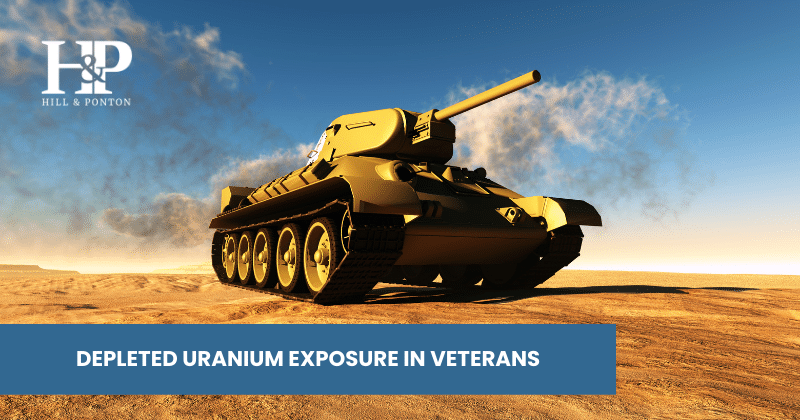Depleted uranium munitions are one of the common causes of depleted uranium exposure in veterans. Veterans who worked with this type of munition and other uranium metals during military service may be suffering side effects due to the exposure.
Since the 1991 Gulf War the United States has regularly used depleted uranium ammunition in military operations. Now that the side effects of depleted uranium ammunition are known, many countries and even the United Nations have called for the ban of depleted uranium ammunition.
In this article, we will explore what depleted uranium is, the side effects, and how you can obtain benefits and compensation due to your exposure to depleted uranium.
What is Depleted Uranium?
Depleted uranium is a type of metal used in military operations. Depleted uranium is high density, meaning it’s difficult to penetrate. Its density is what makes it ideal for combat and military operations. Depleted uranium can be used for heavy artillery ammunition, or for armor plating for tanks.
The components of depleted uranium are interesting and may be a clue as to why the metal is harmful to humans. It is a byproduct of a process that creates fuel for nuclear weapons and reactors.
Because of its components it has radioactive qualities and emits radiation that can penetrate human skin. Though, the depleted uranium is most harmful when ingested. Ingestion can occur by drinking water that has been contaminated by depleted uranium.
What are Some Depleted Uranium Effects?
As we stated above, being around depleted uranium is not necessarily dangerous. The danger occurs when depleted uranium is ingested or inhaled over a long period of time. Some effects of long term exposure to depleted uranium include:
● Neurological issues such as headaches, or tremors
● Respiratory distress such as lung cancer, chronic bronchitis
● Skin irritations such as chronic rashes, and persistent irritation
● Birth defects and reproductive problems
● Increased risk of cancer due to exposure to radioactivity
How are Veterans Exposed to Depleted Uranium?
Many veterans are exposed to depleted uranium through inhalation or ingestion. If a veteran was involved in a friendly fire incident causing smoke or fire to their vehicle they may have inhaled depleted uranium emitted from the metal shields on their vehicles.
Other ways veterans can be exposed to depleted uranium include handling or being in close proximity to depleted uranium munitions. In addition, accidental spills can occur during transport which may expose veterans to inhalation or ingestion of depleted uranium.
Finally, another common way veterans are exposed to depleted uranium include salvage operations or remediation efforts. During clean up efforts, a veteran may inhale dust or debris containing depleted uranium causing exposure.
What are Depleted Uranium Exposure Symptoms in Veterans?
Symptoms can vary widely and depend on the level and length of exposure. We recommend that veterans who think they’ve been exposed to depleted uranium, monitor for the following symptoms:
● Respiratory problems like coughing, wheezing, chest pains
● Kidney problems like changes in urine output, color, smell, swelling in legs and/or feet, and fatigue
● Neurological problems like headaches, tremors, and memory problems
● Prolonged gastrointestinal problems such as nausea, vomiting, and diarrhea.
Veterans who served in the Gulf War, Bosnia, Operations Enduring Freedom (OEF), and Operation New Dawn, are most likely to be exposed to depleted uranium due to its frequent use at that time.
In addition to the above symptoms, if you notice any strange rashes or irritation on your skin at contact points.
VA Depleted Uranium Follow-Up Program
Because the VA has not found any health effects related to depleted uranium exposure to date, they have created the Depleted Uranium Follow-up Program, located at the Baltimore VA Medical Center, to monitor health effects associated with depleted uranium exposure.
This program is designed to identify and address potential health issues, and to provide veterans with resources and support to manage their health issues and concerns.
Eligibility
To be eligible for this program, veterans need to have active duty service in the Gulf War, Bosnia, Operation Enduring Freedom, Operation Iraqi Freedom, or Operation New Dawn.
In addition to your active service you need to have been in or on a vehicle hit with depleted uranium friendly fire, and/or rescued people from or been in burning vehicles, near bruning vehicles, or salvaging burning vehicles involving depleted uranium munitions.
Screening and Follow-Up Care
The program provides detailed physical exams, clinical tests of organ function, and provides treatment recommendations such as surgical removal of depleted uranium fragments if necessary.
This is just one of the many programs that have cropped up to study depleted uranium exposure and side effects. Contact your local VA office to find a clinic near you.
VA Benefits for Veterans Exposed to Depleted Uranium
You may be eligible for service connected disability compensation due to health problems caused by depleted uranium exposure.
Because studies are vague, there is no presumption of illness caused by exposure so having a medical authority provide a nexus statement is vital to a claim for compensation.
An independent medical evaluation by a doctor is excellent to acquire medical evidence and it will be worth the price in the long run if a mild kidney or lung condition eventually develops into something worse later.
Getting service connection now ensures that complications later will be covered. Veterans can later file for an increase in their rating if the conditions become more serious.
Because the studies are limited, the evidence only has to show that the condition is “at least as likely as not” related to the exposure, not that it was absolutely related, so the chances are on the side of the veteran to win a compensation claim if it is filed with the correct evidence and documentation.
In conclusion, depleted uranium exposure is a serious concern for many veterans who have served in areas where depleted uranium was used or handled. Exposure to depleted uranium has been linked to a range of health problems, including respiratory problems, kidney damage, neurological symptoms, skin problems, gastrointestinal problems, and an increased risk of cancer.
The U.S. Department of Veterans Affairs (VA) offers a range of benefits and services for veterans who may have been exposed to depleted uranium during their military service. These benefits include disability compensation, health care, specialized health programs, education and training, vocational rehabilitation and employment, and home loans.
It’s important for veterans who may have been exposed to depleted uranium to seek medical attention and to inform their healthcare provider about their potential exposure. Veterans who are concerned about depleted uranium exposure should contact their local VA medical center or VA regional office to learn more about available resources and programs.
Have Questions About Agent Orange Benefits?
The attorneys at Hill & Ponton are here to support you in your claim and determining your agent orange disability percentage. If you are intending to appeal a denied claim, you can contact us for an evaluation.
We also offer a free ebook The Road to VA Compensation Benefits, to help break down the claims process from start to finish. Click the link below to learn more.





